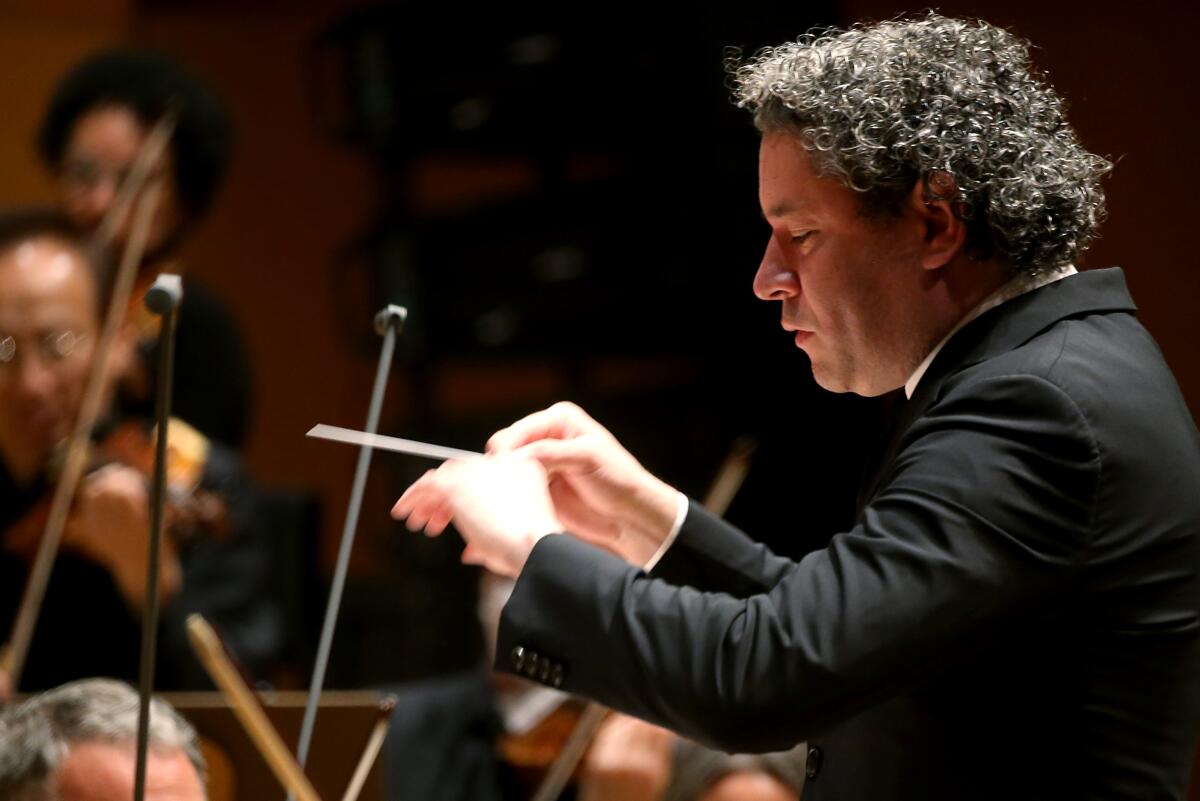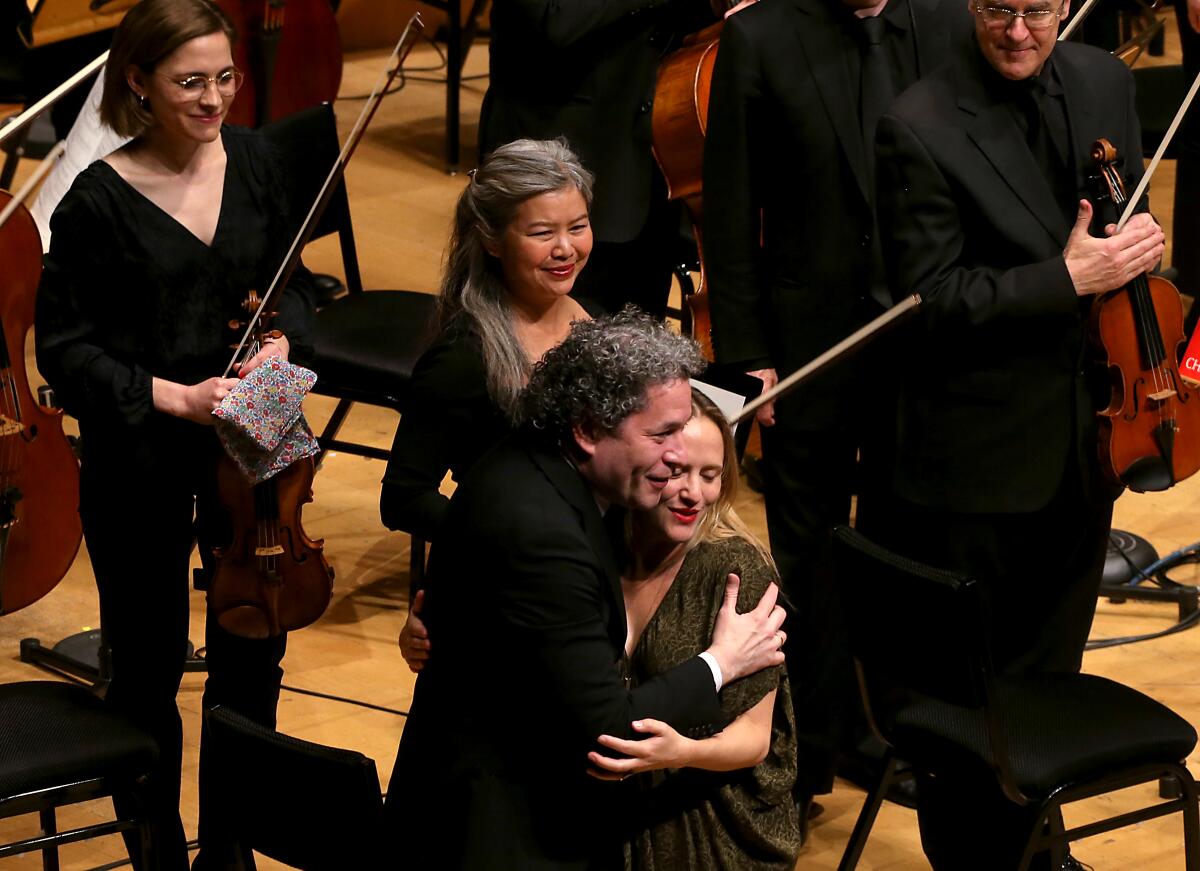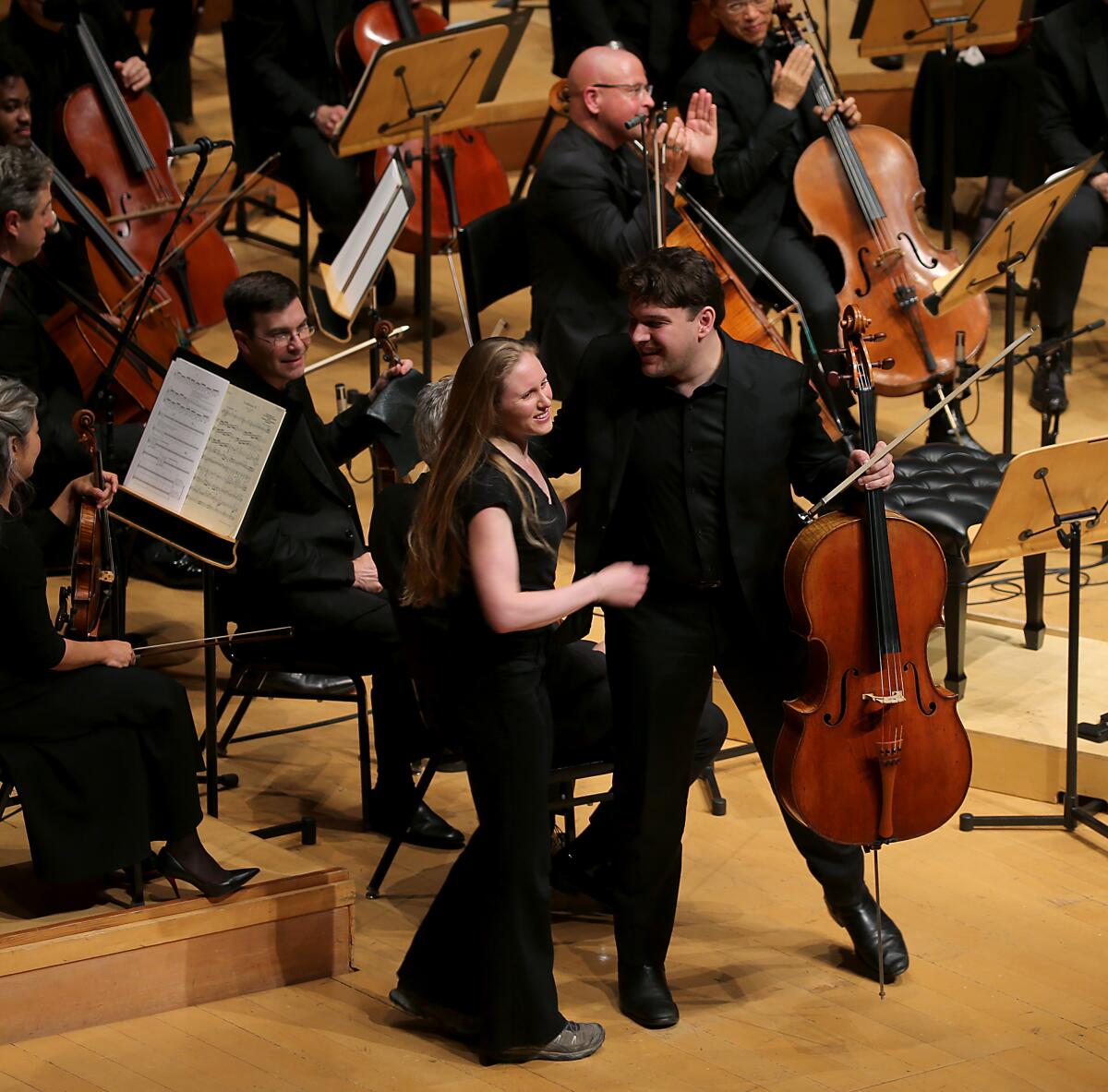Review: At a time of disruption, Dudamel returns to the L.A. Phil for premieres by Ellen Reid and Gabriella Smith

- Share via
It was business as usual for Gustavo Dudamel and the Los Angeles Philharmonic over the weekend. Walt Disney Concert Hall was sold out for its three performances, Thursday, Friday and Saturday. The program was a Dudamel specialty: two world premieres by exhilarating composers, Ellen Reid and Gabriella Smith, with ongoing L.A. Phil associations, and Beethoven’s Seventh Symphony. The orchestra demonstrated a spirit of adventure, excitement, sophistication and warmth. At the performances I attended, Thursday and Saturday, the mood was festive and the audience happily drank it all in.
That, however, felt anything but business as usual this disruptive year for the L.A. Phil and Dudamel. The week in early February when he returned to L.A. for his first concerts of 2023 here — a Rachmaninoff festival with pianist Yuja Wang — began with Dudamel’s startling disclosure that he had accepted a five-year contract to become music director of the New York Philharmonic beginning with the 2026-27 season. Even though he had three more seasons with the L.A. Phil, his relationship with the orchestra and the city had taken on an unexpected new meaning.
After his three-month absence, during which he has been feted by the New York media as a superstar savior, Dudamel has returned to L.A. with yet more disruption. Chad Smith, with whom Dudamel had worked closely throughout his L.A. Phil tenure, suddenly resigned as CEO to head the Boston Symphony. Paris Opera, where Dudamel has been music director for two seasons and the musical talk of the French capital, announced Thursday morning that Dudamel would leave his post after next month to spend more time with his family. Breaking a contract — Dudamel had four more seasons to go in Paris — might seem out of character for a conductor known for his loyalty and overachieving workload.
What does that mean for L.A.? Or New York? We can only wait and see. The New York Philharmonic (which could not work out a slot in Dudamel’s schedule for him to appear next season) greeted the Paris news as maybe allowing him more time with his prospective orchestra. The same could be true for L.A., where Dudamel has less presence now that his family is based in Madrid. But for now, at least, his latest L.A. Phil concerts were encouragingly all about continuity, even if they were planned well over a year ago.
For one thing, both Reid’s “West Coast Sky Eternal” for string orchestra and Smith’s “Lost Coast,” a cello concerto, are dazzling works devoted to the here and now, the pull of nature and time on the West Coast in an era of environmental crisis. For those who haven’t yet taken the 40-minute video walk “Thought Experiments in F# Minor” through Disney Hall (it’s free and fabulous and available most days when there is nothing otherwise happening in the hall), you will encounter a work by Reid (“#Bang huM oFFice ruin”) commissioned for members of the L.A. Phil. Reid has also put her stamp on Griffith Park and the UCLA campus with her soundwalks that can be downloaded on mobile phone apps.

In her new piece, Reid looks up at the sky above us, seeking a wide-angle panorama. It begins with what could be mistaken for the players tuning up for playing Samuel Barber’s “Adagio for Strings.” But before the saccharine sets in, violins start upward slides, suggesting liftoff. We enter a symphonic troposphere where clouds are clotted harmonies, where turbulence is a string orchestra plucking and strumming violins and violas like guitars. There are squalls of high pitches and low rumbles. The earlier glissandi turn downward for a descent.
A year ago Esa-Pekka Salonen led the L.A. Phil in the premiere of Smith’s “Breathing Forests,” an extraordinary organ concerto that mimicked California’s forests in which the intricate lives of trees must learn to cooperate with an increasingly complicated ecosystem. Smith’s cello concerto takes its inspiration from a solitary five-day hike she once took on the treacherous Lost Coast trail in North California. She describes “stomach-turning drops” in her program note, and she conveys them very well in her concerto, along with the “joy, beauty and wonder” of the vistas.
The score began as a two-movement duet for cellist Gabriel Cabezas, whose virtuosity includes getting the cello to make a whole host of amazing sounds you would never conjure coming from the instrument, and herself handling electronics, which include recordings of her singing various imagined instrumental lines. This morphed into a three-movement work for CD. All of this was preparation for the concerto.

Throughout its 25 minutes, “Lost Coast” contains a wealth of wild sounds, nature attempting to go about its business as usual, however much we keep changing the climate. The score could be nature singing — the buzzing of insects, the roar of leonine brass (whales? bears? wind?). Every player, at some point, becomes a percussionist, no matter the instrument.
Nature is, in the end, rhythm, and our human disturbance of the natural world is a rhythmic turbulence. The last movement of “Lost Coast” is a riot of rhythm. The solo cello drums a duet with drummer in the percussion section, and that brings on a riot of metal. But the essence of “Lost Coast” is a righting of the ruckus. The concerto reveals, with marvel and magnificence, the essential nuance between the indeterminacy of nature’s rhythm and the chaos of our climate interference.
In this, Beethoven’s Seventh Symphony, his symphony of rhythm, fits right in. The L.A. Phil first performed it in 1921, two years after it was founded. Every music director of note — Artur Rodzinski, Otto Klemperer, Zubin Mehta, Carlo Maria Giulini, André Previn, Salonen and Dudamel — have recorded it (and most more than once, although only Mehta and Salonen with the L.A. Phil). Salonen also happened to suggest that his new Sinfonia Concertante for organ and orchestra, which he performed a week earlier with the L.A. Phil, has passages that reflect Beethoven’s Seventh.
Dudamel has his own history with the symphony. Five months after his star-is-born U.S. debut with the L.A. Phil at the Hollywood Bowl, he recorded the Seventh with the Simón Bolívar Youth Orchestra of Venezuela. It was Dudamel’s first major commercial recording. He had just turned 25, and his huge orchestra of players his age and younger come on like their own boisterous force of nature. The performance is loud, fast and furious. The feeling of optimism is overwhelming. There is nothing quite like it, and listening to the performance today can bring tears to your eyes, reminding us of how much of that international optimism of youth we are squandering, politically and environmentally.
Dudamel’s carefully nuanced and expertly controlled L.A. Phil performance of the Seventh Saturday night retains optimism but in more qualified terms. The world 17 years ago was his oyster. It still is. New York can’t get enough of him. But he’s left Paris, he’s slowly rebuilding the Bolívars and he’s leaving, in L.A., the world’s most abundant orchestral oyster reef.
This time the Seventh moved with an implacable rhythmic sense that implied preservation, not disruption. From the thoughtful slow introduction to the buoyant Finale, Dudamel allowed nothing to break the thread. There were wonderful details that came from inner lines gaining novel, alluring prominence.
And there was the wanted joy. In the symphony Wagner famously called “the apotheosis of dance,” Dudamel never lost a beat. Each step was alive. The playing was the L.A. Phil at its most alert. But there was also a new, if ever so slight, wistfulness, an understanding, perhaps, in Dudamel that he no longer can control Beethoven, just as we have no right to control nature. With stomach-turning drops increasingly around every environmental bend, his mature mission may become to observe and conserve.
This week Dudamel turns to late Mozart, the last symphony and piano concerto (with Mitsuko Uchida as soloist), to end the season.
'Dudamel conducts Mozart'
What: Gustavo Dudamel conducts Mozart’s Piano Concerto No. 27 (with Mitsuko Uchida) and “Jupiter” Symphony
When: 8 p.m. Thursday and Saturday, 11 a.m. Friday and 2 p.m. Sunday
Where: Walt Disney Concert Hall, 111 S. Grand Ave.
Tickets: All performances are sold out but check with the box office for returns
Info: (323) 850-2000, laphil.com
More to Read
The biggest entertainment stories
Get our big stories about Hollywood, film, television, music, arts, culture and more right in your inbox as soon as they publish.
You may occasionally receive promotional content from the Los Angeles Times.











